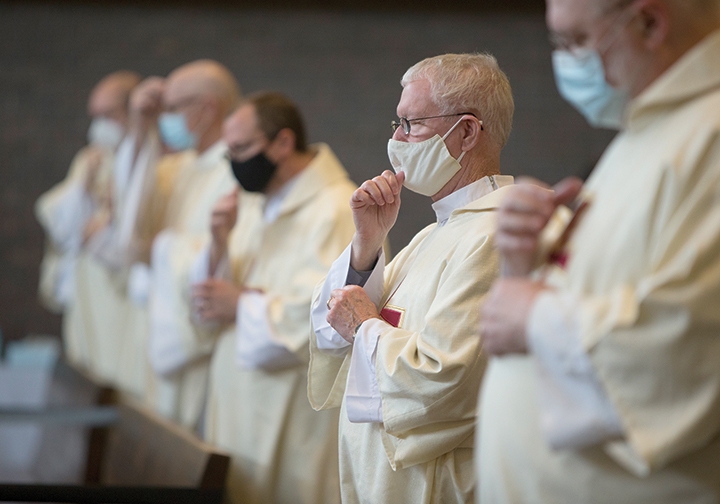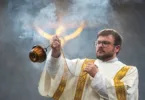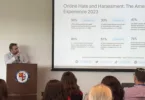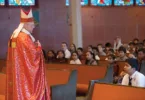
by Leon Suprenant
Special to The Leaven
Q. Many dioceses have had permanent deacons for many years, but they are still relatively new here in the archdiocese. Can we start, then, with: What is a permanent deacon and what does one do?
A. A deacon is an ordained minister in the Catholic Church. There are three groups, or “orders,” of ordained ministers in the church: bishops, priests and deacons. Deacons are not ordained for the ministerial priesthood, but for a ministry of service (in Greek: “diakonia”) that they carry out under the authority of the archbishop.
Deacons are consecrated for ministries of word, liturgy and charity. As ministers of the word, deacons proclaim the Gospel, preach and teach in the name of the church. The deacon’s liturgical ministry includes specific roles in the celebration of Mass, where he helps the faithful to unite their lives and concerns to the offering of Christ. And as ministers of charity, deacons are leaders in identifying the needs of others, then marshaling the church’s resources to meet those needs.
All that the deacon does flows from his sacramental identity as an “icon” of Christ the servant.
Q. Are permanent deacons expected to become priests?
A. No. It is true that seminarians are ordained as “transitional” deacons prior to their ordination as priests, but “permanent” deacons are called to serve the church as deacons, not as priests.
Q. What kind of men make good deacon candidates?
A. There is a maxim that “God does not call the qualified but qualifies the called.” Still, there are some typical signs of a strong diaconal vocation, such as: prayerful, with frequent recourse to the sacraments; eucharistic and Marian devotion; love for the poor; service-oriented; zeal for souls, etc.
In short, they are to be spiritually mature Catholic laymen. A good candidate must either be committed to celibate living or have a strong, faith-filled marriage and family life.
Q. Why does the church need deacons?
A. This is a great question. There is a growing understanding among theologians of deacons as ministers of the threshold or doorway. This image has many applications, and deacons themselves in their persons have one foot in the “church” as members of the clergy and one foot in the secular world.
Pope Francis has called the church a “field hospital.” To extend this analogy, deacons as ministers of the threshold may be seen as “medics,” with one foot on the battlefield alongside the wounded and their comrades, and one foot in the hospital (the church), where they seek to bring the wounded to be treated by the divine physician. There is an ever-increasing need for the mercy of Christ to go across the threshold of the doors of the church out into a hurting world.
That’s where deacons are, and that’s why we need them.
Q. Are all deacons assigned to parish ministry?
A. Most deacons are assigned to assist at a parish as well as to a ministry that is not parish-specific, such as prison or hospital ministry. A deacon is usually assigned to his home parish or a neighboring parish, depending on pastoral need.
Q. How are deacons assigned to their ministries?
A. The office of the permanent diaconate makes its recommendations to Father Brian Schieber, vicar for clergy, and the priest personnel board, which then makes its recommendations to the archbishop, who makes the final decision.
Q. Are deacons volunteers or are they compensated for their ministry work? Are they full time or part time?
A. In a real sense, deacons are “ordained volunteers.” They are not compensated for being deacons and they generally have “day jobs.” However, deacons who are employed by the archdiocese or by their parish (e.g., as an RCIA director or youth minister) are entitled to compensation commensurate with what a layperson would receive for the same job.
There is no such thing as a “part-time” deacon, as every deacon is a deacon at all times, just as there are no “part-time” priests and no “part-time” husbands. However, the amount of time the deacon spends doing formal ministry will vary greatly depending on various factors, most notably his family and work situations.
Q. What role does my wife play if I become a permanent deacon?
A. Most men in the program are married, and their wives are involved at every stage of the process. A married man will not be ordained to the diaconate without his wife’s consent and clear, unambiguous support. What being the wife of a deacon “looks like” varies from couple to couple. Some wives are active in ministry alongside their husbands, while others prefer to stay in the background, especially when the couple has younger children.
Q. How long is the permanent diaconate program?
A. The period of formation has been four-and-a-half years. However, this year, the U.S. bishops added another required year, so going forward it will be five-and-a-half years. Men who begin formation in the fall of 2022 will be ordained in spring 2028.
Q. What are the requirements? Is age a factor?
A. The diaconate is open to Catholic men residing in the archdiocese. Applicants must be at least 29 and under 61 years of age when formation begins in 2022. Obviously there are many other factors considered before an applicant is accepted.
Q. Is this a lifelong commitment?
A. Yes, in the sense that no one ever stops being a deacon. At some point, a deacon may retire from public ministry because of advanced age or ill health, but even then he will continue to be a deacon.
Q. What costs are involved? Do I pay?
A. An annual grant from Call to Share provides for most of the deacon formation expenses. The men in formation are responsible for some expenses, such as books, albs and travel to formation locations.
Q. How do I begin the application process? What does it involve?
A. The first required step is to attend one of the information nights this fall, where these and other questions will be answered in greater detail. Many deacons and deacon candidates attend these events to share their own personal experiences as well. From there, those who are interested (“inquirers”) begin a journey of discernment and growth that just might lead to ordination as a deacon.
Leon Suprenant is the co-director of the office of the permanent diaconate.
Information on the next cohort of deacons
The archdiocesan office of the permanent diaconate will hold a series of information nights at different locations within the archdiocese for those interested in exploring the path to becoming a permanent deacon. All information nights begin at 7 p.m. Those aspiring will be given resources to assist in their discernment. Spouses are strongly encouraged to attend.
• Sept. 1, Savior Pastoral Center, 12601 Parallel Pkwy., Kansas City, Kansas (Spanish language interpreter available)
• Sept. 13, Christ the King Parish, 5973 S.W. 25th St., Topeka (ASL interpreter available)
• Sept. 23, Holy Cross Parish, 8311 W. 93rd St., Overland Park
• Sept. 28, Immaculate Conception-St. Joseph Parish, 711 N. 5th St., Leavenworth
• Oct. 12, Savior Pastoral Center, 12601 Parallel Pkwy., Kansas City, Kansas
Attendance at an information night is required for those who intend to apply for admission to the diaconate program this year.
For information, contact Leon Suprenant, co-director of the office of the permanent diaconate, by email at: leons@archkck.org; call (913) 647-0358; or visit the website at: archkck.org/diaconate/home/resources.






